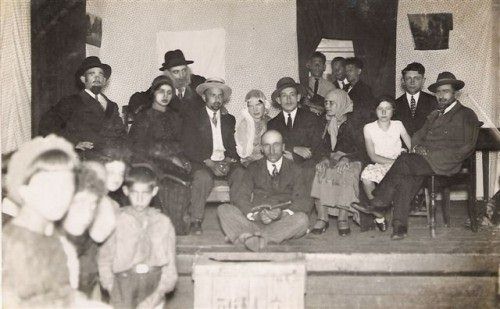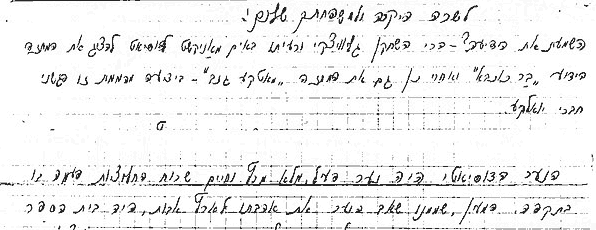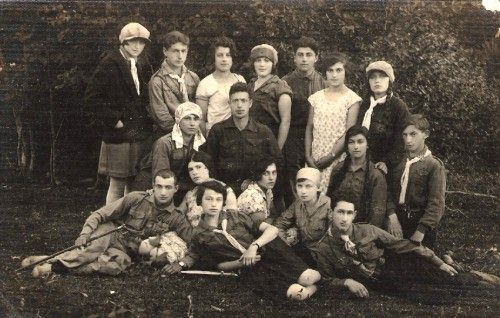[Pages 141 - 142]
Amateur Theatre
Translated by Judy Grossman
|
|
| Amateur Theater in the Shtetl – “The Jewish King Lear”– General Rehearsal
Top: behind the curtains, standing (left at the “door”) Issar Levitt
Seated, right to left: Meir Levitt, Dov-Berl Shub, Roche-Mashka, (- with shawl,
artist from Salok), Shaul Levitt “the groom” and Itale Orlin “the bride”,
Berl Zilber (Dov Caspi), Micha Slep and his sister Miryam, Efraim Zeligson
In front (middle): Hirshke-Berl Berman, the prompter … |
Micha Baron: The play took place in the hall of the Lithuanian school, which had 200 seats. The rehearsal for the play took place on the eve of my making aliya to Eretz Yisrael.
In the picture, behind Issarke Levitt, you can see my shoulder …
Henia Sneh (Blacher): There was an amateur theater in Dusiat. The moving force and spirit behind all the plays was Dovid-Leib Aires, who was the director, producer, set designer and actor.
Dovid-Leib Aires: Many of my memories are connected to the amateur theatre in Dusiat. I had a good voice, was considered a good singer, and if there had been good conditions for learning and studying at the time, I might have gotten somewhere. I recall my childhood, the Hanukah celebration at school. The teacher Hirshke Hammer was handicapped, and played accompaniment for me and Feigitzke Itzik-Moishe's [Zeligson], when we sang the song (in Hebrew) “Yalda, yaldati, yaffa, yaffati…” as a duet. Suddenly Feigitzke forgot the lyrics, and stood there as though she were dumb. I continued singing the entire song by myself, and when I finished the teacher Hillel Schwartz came up to me excitedly and lifted me up.
I appeared on the stage for the last time in 1939. The premiere was in Maccabi. All kinds of Yiddish theatre groups and professional actors without permanent jobs used to go from shtetl to shtetl, and they also came to us. They used to carry out tests, select “actors” from the local population and include us in the play. We used to print tickets for the play. Sixty-percent of the take was given to the actors, and the rest was divided between Maccabi and Bikur Holim[1], which received the major share.
I remember one play organized by Maccabi in honor of the Russian revolution. I wrote the play, and it was called “The Jewish King Lear”. Among the actors were Berke Levitt, Meir Levitt, Leahke Visakolsky – the king's oldest daughter, Rivka Aires – the middle daughter, Efraim Zeligson – the second son-in-law, and Shaulke Levitt – the youngest daughter's fiance. Rachel Shub also took part. We performed in Dusiat, and afterwards we were invited to perform in Salok [Salakas] as well.
Rachel Vitkin (Shub): We also performed “Amcha” and “Zwei Hundert Toisend” [Two Hundred Thousand], and the best actress of all was Gitke Baron, who was an energetic girl with initiative.
Henia Sneh (Blacher): Gitke also played in “Joseph and his Brothers”.
Shayke Glick: I also remember the plays “Chasya the Orphan” and “Mirale Efrat” from that time.
Rachel Vitkin (Shub): We went out for a series of “Gastrolle” [guest-performances] to Antaliepte and Salok [Salakas].
Tzila Gudelsky (Shub): We, the little ones, were also included then and we danced ballet…
Yoel Zeif: Noah Poritz was also a talented actor. He wrote the play “Hanukah in der Kalter Sukke” [Hanukah in the Cold Sukka]. Henke Slep and I also took part in that play.
Dovid-Leib Aires: There was also a prompter. Sometimes it was Yankale Charit.
Henia Sneh (Blacher): I remember Hirshel-Berl [Berman], Bune's son, who was the prompter.
Rivka Shteinman (Shub): Gitke Baron was an excellent actress, but she had the “Litvakes defect” and used to mix up the letter “sh” and the letter “s”. To this day I laughingly recall her doing this in her role in the play “The Jewish King Lear”, when she said the words: “Reisht oif die slishl! Git dem kranken alten taten eshen!” instead of “Reist oif die shlissl! Git dem kranken alten taten essen!” [Break the locks, and bring the sick old father food!]…
In the play “Satan in Paradise” I played the wife of Dov-Berke Levitt, who was an excellent actor, especially in tragic roles. “We” had a “daughter”, a baby. “My husband” suspected me of being unfaithful to him, and he threw me and the baby out. I pleaded with him not to mistreat us that way, promised him that there was no basis for his suspicion, wept bitterly, and while doing so went up to the “baby” carriage and took out the “baby”, which was a doll, a naked doll… The audience, which up to that moment had sat quietly and tensely, suddenly burst out laughing at the sight of the naked doll. When we went backstage, Dov let out all his anger at me and shouted: “What did you do? You completely ruined the play! You completely ruined the play for me!” …
I was silently angry at the director, who hadn't worried about dressing the “baby”.
I had concentrated so hard on the play and tried very hard to memorize the words, and how could I think about whether the doll in the carriage was dressed or naked?
That was the end of my theatrical career…
| We Lack a Stage…
Rivka Shoham (Melamed) (from her notebook [2]):
Drama alternately arouses feelings of sadness and feelings of laughter and jest…
Opera is a tragedy or a comedy, in which the characters don't speak but sing, accompanied by musical instruments…
The operetta is a comedy in which the characters sing, accompanied by instruments, but in the meantime they also speak and argue without a melody…
Regretfully, our Hebrew literature is greatly lacking in plays of all kinds because it lacks a stage… |
| A Film in the Shtetl
Rivka Shteinman (Shub): I will never forget the first film that came to the shtetl.
It was, of course, a black and white silent film screened on a sheet, on the wall of the firefighter's storehouse.
However, in those days it was a rare and thrilling event.
Like fire we went from house to house to announce: “There will be a film this evening.”
While I was running, the wing of a flying beetle got into my eye, my eye began to hurt and tear, and - I didn't see the first film that came to the shtetl…
|
Footnotes
- A Jewish community fund to help people who were ill. Return
- [48] Rivka Melamed's private collection. Return
[Pages 143 - 148]
”Bar-Kochba” on the Dusiat Stage …[1]
By Yaacov Charit
Translated by Judy Grossman
|
|
| An excerpt from Yaacov Charit's first secret letter … |
“Have you heard the news? – The actor Glivitzki and his wife are coming from Aniksht [Anyksciai] to Dusiat to perform the well-known play 'Bar-Kochba', and afterwards they will also put on the play 'Motke Ganev' [Motke the Thief]” …
This was the astounding news with which my friend Yoelke [Yoel Zeif] greeted me.
You need to know: we were four friends that were always together, and if you called one of us, all the four would immediately show up: Itzke [Shteinman], Yoelke, Honke [Glick] and Yankale. Years later Itzke became the husband of my sister Itkale and they were both killed in the Holocaust. Yoelke lives in Israel. Honke drowned in Lake Sartai beside Dusiat, and Yankale is stuck in the galut [Diaspora].
In order for you to understand why the shtetl was buzzing and its inhabitants trembled at the actors' performance, I need to draw you a picture of the Dusiat youth of that time, approximately 1926. Listen well:
The School and the Youth Movement
The youth of Dusiat was active, full of energy and life, imbued with the pioneering spirit. The source from which the youth drew its love for “The Land of Our Fathers” was the elementary folk school, headed by the teachers Hillel Schwartz, Yehuda Slep and Zvi-Hirshl Hammer. They perished during the Holocaust along with their students. Yitzchak Poritz (Porat) also taught for a while. The children of Dusiat attended the school, which had four grades and a preparatory class, for five years, and when they left it they spoke fluent Hebrew and were filled with love for their people and the Jewish history, and they greatly aspired to be among the builders of Eretz Yisrael. As an example they had former Dusiaters, the chalutzim (pioneers), such as Yosef Yavnai [Slep] and his brother Avraham [Slep], Yitzchak Toker, Daniel Zeif, Rasya Kagan and Rivka Levitt, and many more whose names I won't mention.
The “ken” [cell] of the Dusiat Council - a branch of the “Union of Jewish Scouts – Hashomer Hatzair in Lithuania - headed by Yoel Zeif and the Hashomer committee, was highly influential in the completion of the pioneering education. The clubhouse was located in the poor home of the Dusiat jester. At “kibbutzim” (activities) which took place inside dormitory walls or outside in nature, in the paltry Silvitzke's Grove of the farmer Silva, the scouts expanded their knowledge of kibbutz life in Eretz Yisrael, and argued about “Hakibbutz Haartzi” [affiliated with Hashomer Hatzair] and “Hakibbutz Harussi”, etc. They spoke only Hebrew and sang songs of the Shomrim [members of Hashomer Hatzair] and the Chalutzim …
Every summer Yoelke and his friends organized outdoor camps for a few days. The camp was located in a dense forest beside the river, near the granary, on the land and with the permission of a rich Lithuanian. The camp left a deep impression on every scout and shomer, an impression that was never erased. You could say that the spirit of “The Land of Our Fathers” pulsated in the shtetl. It's enough to say that the signs in the shops were written in Hebrew and in the national language, Lithuanian.
|
|
The Student Yaacov Charit Visiting the “Ken” of Hashomer Hatzair in Dusiat
Right to left, standing: Mirka Slep, Shoshana Musel (from Obeliai), Yaacov Charit,
Henka Slep, Rachel Platin (from Obeliai), Noah Poritz, Dalka Slovo
Middle row: Dov Shub, Zeldka Charit, Yoel Zeif, (-)
Seated: Michle Orlowitz (from Rakishok), Tzirka Kagan, Itale Orlin
In front: Shlomo Gurtwitz (from Obeliai), (-), (-) |
In order to complete the collective picture of the shtetl, I also need to mention the library, which was located in the home of Meir Levitt. This library contained books in three languages: Yiddish, Hebrew and Russian. Dozens of young Dusiaters ate and drank from this source, which numbered several hundred books. Obviously, the library could only provide a tiny amount of spiritual food to the residents, and they also enriched their knowledge from the newspapers “Yiddishe Shtimme”, “Folksblatt” and “Dos Vort”, which everyone in the shtetl read. However, since the cost of the newspaper was very high in relation to the shopkeepers' income, three or four of them became wise and together subscribed to one of each paper. More than once the news reached the reader four days later and after their main points had changed. But there was no drop in the readers' spirits. They all considered themselves experts and experienced in the rules of governing the country, and in the synagogue, between minha and maariv [the afternoon and evening prayers], when the shops were already closed, the people gathered around the iron stove that gave off heat as hot as in hell, and that is when they showed off their knowledge of politics. Each one noisily silenced his opponent, and holding the buttons of his coat lest he escape him, he proved to him with signs and wonders and with passages from the newspaper, that only he understood and knew what would happen in the near future. Each one tried to show that the fate of the anti-Semites would be black and bitter, the proof being: “Anyone who assassinates Jews – finishes up with the Angel of Death...”
Footnote
- [49] This article was sent secretly to Sara Weiss-Slep in five letters from Vilnius (1983). Return
This material is made available by JewishGen, Inc.
and the Yizkor Book Project for the purpose of
fulfilling our
mission of disseminating information about the Holocaust and
destroyed Jewish communities.
This material may not be copied,
sold or bartered without JewishGen, Inc.'s permission. Rights may be
reserved by the copyright holder.
JewishGen, Inc. makes no representations regarding the accuracy of
the translation. The reader may wish to refer to the original material
for verification.
JewishGen is not responsible for inaccuracies or omissions in the original work and cannot rewrite or edit the text to correct inaccuracies and/or omissions.
Our mission is to produce a translation of the original work and we cannot verify the accuracy of statements or alter facts cited.
 Dusetos, Lithuania
Dusetos, Lithuania
 Yizkor Book Project
Yizkor Book Project
 JewishGen Home Page
JewishGen Home Page
Yizkor Book Director, Lance Ackerfeld
This web page created by Lance Ackerfeld
Copyright © 1999-2024 by JewishGen, Inc.
Updated 19 Dec 2009 by LA





